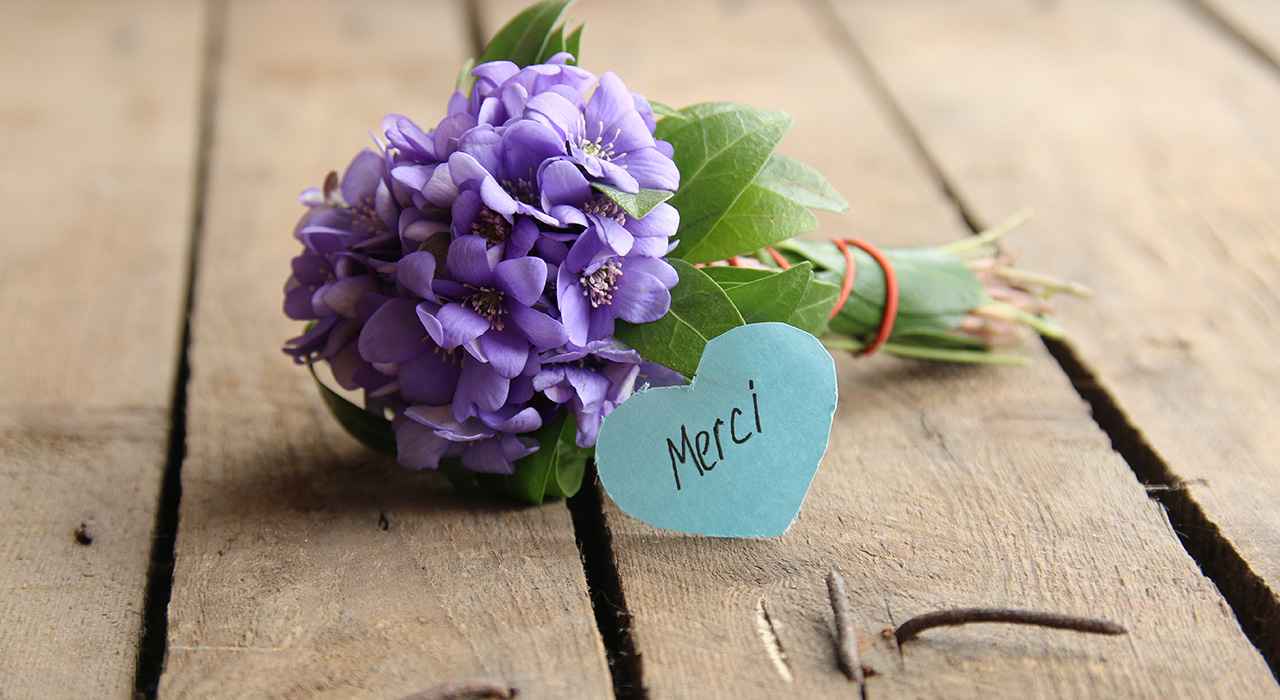16 Different Ways to Say “Thank You” in French
Learning to say “thank you” in French is one of the most important things you will ever do.
Why? It’s simple. Figure out the culture of your target language and you will find the heart of its people. And France loves a person with good manners.
Learn what’s considered polite in your target language. That’s what Julia Child did. And Parisians loved her for it.
“The sweetness and generosity and politeness and gentleness and humanity of the French had shown me how lovely life can be if one takes time to be friendly.” ― Julia Child, My Life in France
“Thank you” in French – A Quick and Easy Guide
What is “thank you” in French?
Here’s a quick and easy table for how to say “thank you” in French. For the ins and out on how do you say “thank you” in French, keep reading.
| Formal “Thank you” | Je vous remercie |
| Informal “Thank you” | Je te remercie |
| “Thanks” | Merci |
| “Thank you very much” | Merci beaucoup |
| “Thank you so much” | Un immense merci |
| “No, thank you” | Non, merci |
| “Thank you my friend” | Merci, mon ami/amie |
| “Thank u” via cell phone | Mci |
| “Thank you” in French slang | Ci Mer |
| “Thank God” | Dieu merci |
| “Many thanks” | Mille mercis |
| “Thank you beautiful” | Merci, ma belle |
| “Thank you for everything” | Merci pour tout |
| “Thank you for the meal” | Merci pour le repas |
| “Thank you for the succulent meal” | Merci pour le repas succulent |
| “Thank you for your business” | Nous sommes heureux de faire affaire avec vous |
| “Thank you” in formal correspondance | Je vous prie de recevoir l'expression de mes salutations distinguées |
| Formal “You're welcome” | Je vous en prie |
| Informal “You're welcome” | Je t'en prie |
| “It's nothing at all” | C'est rien du tout |
| “With pleasure” | Avec plaisir |
| “No problem” | Pas de problème |
| “It's nothing” | De rien |
What’s the best way to say “thanks” in French? Well, that depends.
Let’s take a closer look and find out what will best suit you. In any situation.
In this article, I’ll explain the different ways to say “thank you” in French. So that you can make new French friends. And keep the ones you already have!
Some of our tips may surprise you. Like how to avoid looking like a pushy tourist. More on that in a bit.
And be sure to watch our video with French teacher, Léa, founder of The Staircase Method to be sure you pronounce these different ways of saying “thank you” in French correctly:
1. “Thanks” in French – Merci
Merci is the first version of “thank you” in French that I recommend learning. Why? Because it’s easy and it’s versatile. You can use it in most situations. You can say merci to thank a shopkeeper. You can use it to show gratitude for the favor your friend did for you.
The place to avoid using merci? In particularly formal situations. This phrase wouldn’t be seen as acceptable for using at work in France with a strict boss.
2. “Thank you” in French to a stranger: Je vous remercie
In French, there are two forms of the word “you”. Vous is the formal version of “you”. Tu is the informal version. To be safe, stick with vous until your conversation partner suggests otherwise.
Using tu with someone you don’t know well can be considered impolite. So much so, that French police are required to use the formal version of you everytime they speak to someone. It’s the law, yo!
You even use the vous form when speaking to a salesperson. When in doubt, pull vous out.
3. “Thank you” in French to a friend: Je te remercie
Je te remercie is one way of saying “thank you” to someone you know well. Maybe it’s your language exchange partner. Maybe it’s a friend from school. If they use the informal tu with you, it’s safe to use it with them, too.
Te the reflexive pronoun for tu. You’ll learn more about that as you enter into intermediate territory.
Benny Lewis, founder of Fluent in Three Months, recommends that beginners pick one form of “you” (vous or tu) and learn that one first. This is exactly what I did with my italki tutor when I was only a few days into my French studies. I used tu at first.
But of course, I asked her permission.
4. “Thank you very much” in French – Merci beaucoup
Merci beaucoup is another nice phrase that you can use in most situations. You’ll likely hear it a lot, too.
Some learners say something that sounds like merci beau cul which means “Thanks, nice butt.” In most situations, you’ll want to avoid that.
5. “Thank you so much” in French – Un immense merci
This way of saying thank you in French isn’t used a great deal in France. Why? Because Amercians exaggerate in everyday conversations. The French do not. Saying that you ate at the best restaurant in the world might puzzle your Parisan buddy. Likewise, it’s rare for French people to give an “immense” thank you.
Merci beaucoup is more often used by native speakers in Paris and across France.
6. “No, thank you” in French – Non, merci
Another short and sweet phrase to get your point across. Don’t want an extra helping of escargot at Auntie Lisette’s house? Non merci will come in handy for this occasion.
7. “Thank you, my friend” in French – Merci, mon ami/e
When a French person calls you their friend (ami), they mean friend for life. When an American calls you their friend, it has a lighter feel. Be careful with throwing the word “friend” around. It might lead to hurt feelings if you decide not to hang out with that person in the future.
You can read more about French culture in the book The Bonjour Effect.
Here’s a reminder about the French words for friend:
- Ami – Male version of “friend”
- Amie – Female version of “friend”
8. “Thank u” in French via cell phone – Mci
Ah, texting. What would a post on a modern language learning blog be without a sample of how to text a quick “thx” in French?
Mci will do the trick. You’ll look like an sms native!
9. “Thank you” in French slang – Ci Mer
There is a version of Pig Latin in French. Only it’s not outdated like its porky English cousin. It’s called Verlan. It’s slang. It’s hip. And it’s confusing.

To use this phrase when thanking someone, switch the two syllables of merci around and there you have it. Ci mer is Verlan for “thanks”.
10. “Thank God” in French – Dieu merci
You’re stuck in the rain after a night on the town. It’s two in the morning. All the gift shops are closed except one. And yes, they sell umbrellas.
Now would be a great time to thank your lucky stars by saying, Dieu merci! That’s “Thank God!” in French.
11. “Many thanks” in French – Mille mercis
This phrase literally means “a thousand thank yous”. It’s used from time to time in the Instagram language learning community. A good Samaritan will correct someone’s French and the poster will add a mille mercis to the comment thread.
12. “Thank you, beautiful” in French – Merci, ma belle/ma grande
Be careful with this one. You don’t want to overstep your boundaries. This phrase can be used for little ones you know or someone very close to you.
Don’t use this phrase with people you don’t know, it’s inappropriate.
13. “Thank you for everything” in French – Merci pour tout
Your tutor helped you figure out how to tackle the subjunctive. Merci pour tout would be appropriate for this type of appreciation. If you don’t agree, you haven’t studied the subjunctive yet.
14. “Thank you for the meal” in French – Merci pour le repas
Bellies warm with an exquisite French meal. How ever will you thank the chef when he comes to your table? A simple merci pour le repas will suffice.
But what about a meal that makes the room glow? Merci pour le repas succulent. “Thanks for the succulent meal.” Yup, that should do the trick.
15. “Thank you for your business” in French – Nous sommes heureux de faire affaire avec vous
Nous sommes heureux de faire affaire avec vous means “We are happy to do business with you.”
You just signed a multimillion dollar deal with your new French client. You want to show them that you’re grateful for their business. This is the perfect phrase. Notice we use the vous form of “you”.
Don’t want to miss out on all the profit by slipping into informal speech.
16. “Thank you” in formal French – Je vous prie de recevoir l'expression de mes salutations distinguées
This phrase translates to, “I beg you to receive the expression of my best regards.” It’s a decorative way of signing off in a formal letter. Ah, the French and their curlicue ways of signing off in letters!
Bonus Round 1: How to avoid being seen as a pushy tourist in France
There’s a secret to not looking like the pushy genie in Aladdin when speaking to a French native speaker.
Stop smiling so much. In America, we are big on smiles. It’s our thing. But it’s a little too much for other parts of the world.
My language partner shared that someone who smiles too often is considered untrustworthy. Smiles are sacred in France. Because of this, making a Parisian waiter smile is one of my favorite things to do.
Bonus Round 2: “You’re welcome” in French to a stranger – Je vous en prie
Someone thanks you in French. What do you do? You do the hokey-pokey and you turn yourself around. That’s what it’s all about! Just kidding. Actually, you say Je vous en prie.
With this bonus round phrase, you can respond to your French coworker when she thanks you for help on the last minute deadline. Remember, vous is formal.
Bonus Round 3: “You’re welcome” in French to a friend – Je t'en prie
What about when your friend thanks you for offering him a ticket to the Cannes festival? Well, je t’en prie is the perfect response.
The te (“you”) is shortened in this phrase to t’. Get used to it. The French language has a serious apostrophe addiction.
Other informal ways to say, you’re welcome in French:
- C'est rien du tout. – “It is nothing.”
- Avec plaisir ! – “With pleasure!”
- Pas de problème. – “No problem.”
- De rien. – “It’s nothing.”
How to Say “Thank You” in Canadian French
You’re in luck because you can use all the phrases listed in the article in Quebec, too.
Take Your Pick!
What’s your favorite phrase from this post? Let us know in the comments. And if you have a fun story about your French learning journey, please share it. I love hearing from other learners.
Bonne chance, mes amis ! “Good luck, my friends!”



Social